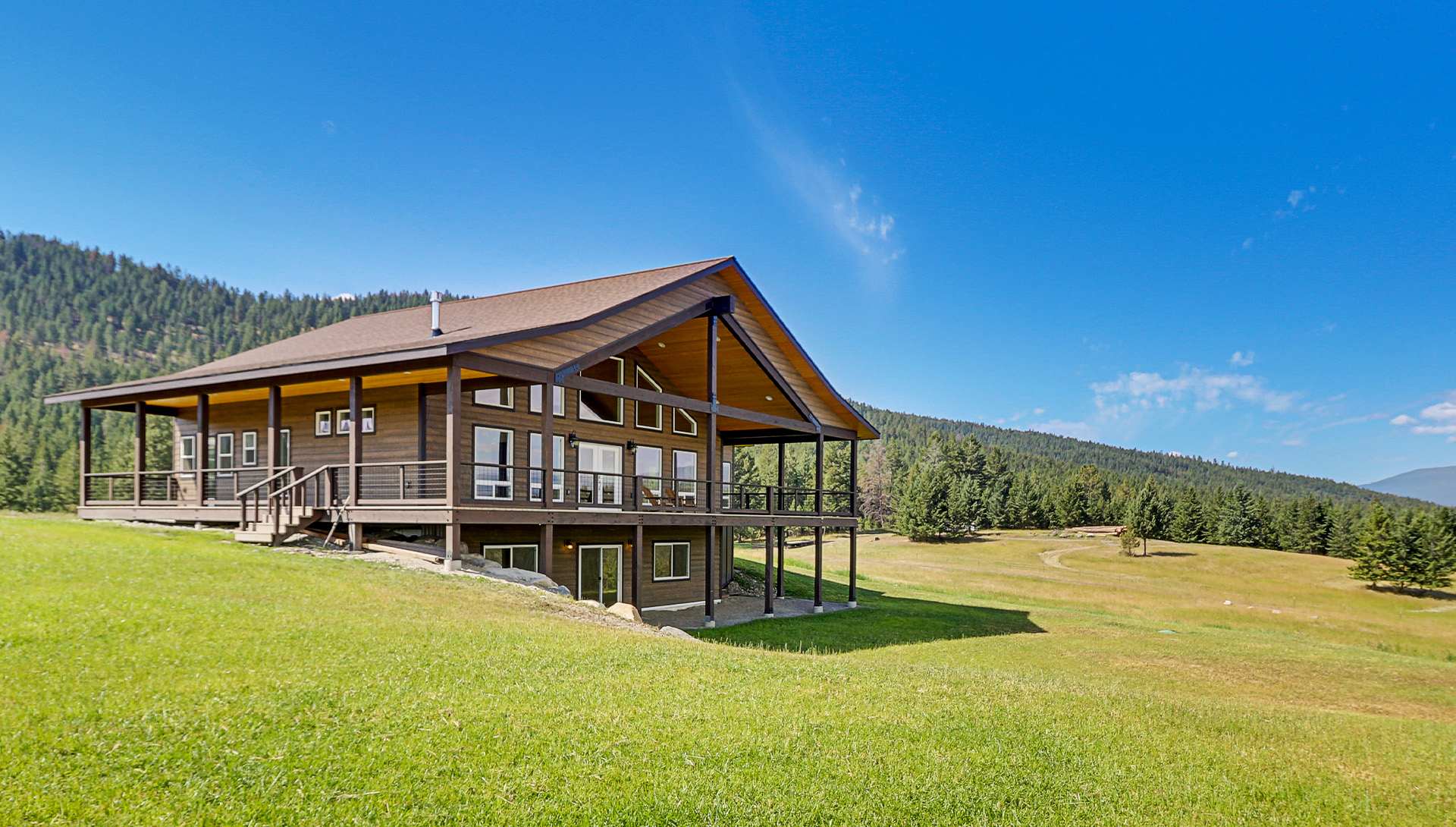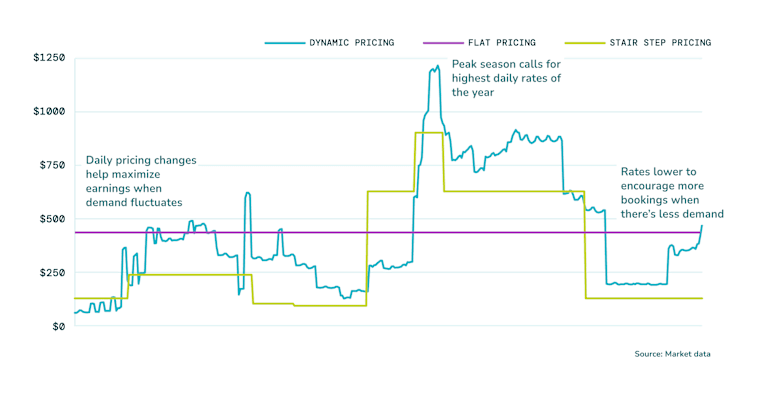10 Ways to Maximize Your Vacation Rental Income This Year

If there’s one thing every successful vacation rental owner needs to be, it’s adaptable. Industry trends are constantly changing, and your revenue optimization strategies must continually change with it to maximize rental income.
But with all the nuance of shifting market conditions, there are also actions owners can take with consistent profit-driving value — those you should repeatedly revisit to set yourself up for success in any vacation rental landscape.
And it’s more important than ever to make these moves now. An ongoing imbalance between supply and demand growth this last year has created a highly competitive traveler’s market, where winning bookings means leveling up every aspect of your business.
Oh, and make no mistake: there’s still plenty of revenue opportunity to grab across the U.S. — nearly $19.8 billion worth in 2024. It’s all a matter of how you strategize. So, here’s how to maximize vacation rental income this year and make the most of your performance potential.
In This Article:
Invest in Valuable Amenities and Upgrades
Update Your Decor
Keep Your Listing Up to Date
Take Advantage of Your Property Size
Open Your Calendar for Bookings
Consider (and Re-Consider) Your Policies
Use Dynamic Pricing
Provide Exceptional Customer Service
Upsell Perks and Experiences
Encourage Positive Reviews
1. Invest in Valuable Amenities and Upgrades
When guests search for vacation rentals, they know what they want. Investing in the things that draw the most attention from travelers in your area puts your home in the running for more bookings — and boosts the value of one. This not only gives your rental a competitive edge, but also an opportunity to increase rates and drive more income.
There are even certain amenities that guests want to book no matter their destination. Data shows properties with hot tubs, for instance, tend to see 29% more bookings throughout the year nationwide than those without.
Other amenities have region-specific value — like outdoor gear in the South and pet-friendly adds out West — so zeroing in on what has the most impact locally is the next step in leveling up your investment opportunity.
To truly maximize your vacation rental income, the best time to upgrade amenities is in your market’s shoulder or off seasons. That’s when you’re likely to have more time between bookings, so you can make in-home changes without impacting the guest experience and you’ll be prepped in time for high-season volume.
That said, the sooner you invest in your home’s value, the sooner you can reap the rewards. So if you have the time and resources to install upgrades quickly — again, without disrupting the chance for your guests to give a five-star review — jump on your earliest opportunity.
2. Update Your Decor
How your vacation rental is furnished can also make a significant impact on your revenue potential. Once a guest locks in their must-have search criteria (like location, property size, and key amenities), they’re shopping visually. In fact, 75% of online shoppers rely on photos to inform their buying decisions. Great interior design helps your listing pop in search results and inspires travelers to book — and can drive higher rates.
Our design and furnishing partner provides expert staging support with profit-driving results, helping owners increase nightly revenue by 22% on average.
When purchasing furniture and decor, create a cohesive style that keeps your potential guests top of mind. Neutral color palettes can appeal to a wide variety of bookers, but you could also consider what details might play well for travelers to your area. Cozy throw blankets and plush rugs can warm up mountain cabins, for instance, while airy, coastal accents might tie in well for a beachfront home. If family vacations are popular in your market, make your furniture and decorative touches kid-friendly, and consider designing fun play spaces or kids’ bedrooms.
You also always have the option to really lean into a theme, like a cult-classic movie or historical era. When you outfit your property to be a unique vacation rental, you can further distinguish yourself from local competitors and make your home the click-worthy destination in your area.
Of course, you don’t just want your decor to look great — you want it to be great. Prioritize:
- Functionality: Guests should find it easy to settle in and actually use your space like it’s their own. Your seating options should comfortably support the max number of guests you can host, light sources should be easy to find and switch on, and all couches and beds should have easy-to-reach surfaces (like coffee tables or nightstands) nearby.
- Durability: Vacation rentals tend to experience a higher rate of wear-and-tear as guests frequently rotate through. Look for high-quality furniture that’s built to last and easy to clean — and avoid trinkets that could break easily. Not only can this save time and money in the long run by minimizing the need for replacements or repairs, but it could also help create more consistent guest experiences that inspire five-star reviews.
3. Keep Your Listing Up to Date
While it’s always important to keep your rental as-advertised, it’s especially important when you invest in amenities or significant decor updates. Making sure your listing reflects new profit-driving perks can help you rank higher in guest searches and show up in more of them. Offering high-value adds and great design can also allow you to charge more per booking, which could translate to more vacation rental income.
And remember: once key search criteria is in, potential guests are drawn to your listing photography to help visualize their stay in your home. Having high-quality imagery to showcase your new hot tub or updated backyard space can take them from looker to booker.
Pro tip: The best way to guarantee your photography makes the right impact is to opt for professional images. Our data shows listings that have ’em can generate up to a 20% annual increase in earnings on average.
Showcasing new investments accurately should always be top of mind, too. No guest wants to get to a property that doesn’t match what they booked online, so your listing description should clarify any seasonal considerations for amenity usage, and your photos should never distort a space. When you miss that mark, you run the risk of negative reviews that can seriously damage your listing’s reputation and hurt your ability to maximize vacation rental income. A big part of growing your revenue is eliminating any potential to miss out on it.
Our experts custom craft and regularly refresh property listings so guests stop, look, and book on all the top sites — and we include professional photos to highlight your home’s must-book features.
4. Take Advantage of Your Property Size
Another way to maximize short-term rental income is by making room for more travelers. Increasing the number of sleep accommodations makes your property accessible to larger groups of guests — which can help cast a wider net for bookings and incrementally boost revenue.
If one of your bedrooms has a twin bed, for instance, consider swapping in a full or queen so the room can work just as well for pairs. Go a step further with adult-size bunk beds, or a sleeper sofa in your living area.
Just keep in mind: certain vacation rental markets put limits on the number of guests you can have in your home (or any given bedroom), so it’s important to double-check your local regulations before increasing capacity. You’ll also want to consider your bed to bath ratio. Guests need to be able to share bathrooms comfortably, so even if you could technically support 12 guests with added sleeping accommodations, you may run the risk of poor reviews — or miss out on bookings altogether — if those guests only have access to two bathrooms. Plus, too much strain on your plumbing could result in more frequent maintenance and repairs.
Once you strike the ideal balance, don’t forget to update your listing so you show up in relevant guest count searches. You’ll also want to review your home inventory to make sure it covers the number of guests you can now host, stocking up on things like bedding, bath towels, dinnerware, and cutlery.
5. Open Your Calendar for Bookings Across Top Sites
Opening as many dates as possible to potential guests is a key unlock in how to make more money on Airbnb, Vrbo, and other top sites. In such a competitive vacation rental landscape, blocking just three months of your calendar could result in 28% less annual revenue — and that loss grows as your blocks increase.
Even in your off-season, you want to be open to guest reservations. This is the time to win attention from travelers who come to enjoy your area without as many tourists and crowds.
Once you’ve unblocked more time for bookings, it’s critical to keep your calendar updated across platforms. Having accurate availability on every booking site helps you show up in relevant searches without risking double-booking penalties that can really hurt your bottom line. On Airbnb, for example, double-booking could mean you not only get hit with cancellation fees, but you might also lose the ability to re-book those dates and get dinged on your listing’s visibility.
Certain tools can help you manage this yourself. But to really maximize short-term rental revenue, it’s best to work with a management company like Evolve whose channel marketing strategy also gets you on high-traffic booking sites DIY owners can’t access (like Google Vacation Rental, Expedia, and Hopper Homes) — all while taking the day-to-day calendar maintenance off your plate.
6. Consider (and Re-Consider) Your Policies Based on Market Trends
It’s no secret that maximizing your vacation rental income requires you to pull a variety of strategic levers, and one of those is the policies you set — particularly since it’s best to look for ways to influence your performance outside of just changing your rates.
That’s because as market trends shift, so do guest behaviors. Continually evaluating your policies to limit restrictions can appeal to more travelers, open up more days available to book, and bring in extra income.
If you have upcoming gaps, consider adjusting your length of stay requirements to accommodate next-day check-ins and fill those open spots. Explore a more flexible cancellation policy, too, to increase your property’s overall visibility — many guests search with “free cancellation” filters applied — and encourage confidence to book (an approach that can lead to 53% more revenue).
Market seasonality plays a role here, too. You might see different occupancy patterns — like how far in advance guests tend to book or how long they generally stay — depending on the time of year. Proactively adjust your length-of-stay and cancellation policies to match what travelers to your area look for seasonally.
Also, don’t forget that traveler trends vary across regions, so you’ll want to lean into what’s important for customers in your market. See if it’s a top destination for pet-friendly vacations, for example, by conducting a search for pet-approved properties near yours. You’ll get a sense of the earning opportunity you’d have when you allow furry friends, and can then consider adjusting your pet policy to boost bookings.
7. Use Dynamic Pricing
Market conditions can change daily, and your rates should pivot just as quickly.
That’s why a dynamic pricing strategy is best. It takes several factors into account (like seasonal trends and the calendar availability of rival listings in your area) to keep your home competitive. Unlike flat or stair step pricing — both more traditional approaches — you can raise rates when demand is high and encourage bookings at lower price points when things slow.

With these best practices in place, you’re way less likely to miss out on year-round earning opportunities. Compared to other rate-setting tactics, owners who make dynamic adjustments can earn up to 40% more annual revenue.
8. Provide Exceptional Customer Service
Guests aren’t just looking for the perfect listing — they also want five-star service throughout their vacation rental experience. From how you interact with them ahead of a stay to the in-home experience you provide, strong hospitality practices drive positive reviews, which greatly influence your property’s performance.
Case in point: our data shows homes with an average rating of 4.5 stars or more can earn 12% more than their lower-rated counterparts. That’s because the vast majority of consumers read reviews before making a buying decision, so a listing with tons of great feedback will likely win their trust over one without. Many booking sites also prioritize listings with stronger ratings in their search results, which means homes with more stars tend to get in front of travelers most often.
To nail your customer service, make sure you communicate quickly and effectively when guests reach out with questions (whether they’re at the property yet or not). Keep your property fully stocked and squeaky clean for every stay. And provide a welcome book and thoughtful gift to help guests feel personally taken care of. Happy guests not only influence the decisions of future travelers, but are more likely to become repeat bookers themselves.
9. Upsell Perks and Experiences
After you have the hospitality basics down, you can boost satisfaction further — and generate more income in the process — when you consider certain added perks:
- Pick-up and drop-off services: Streamline guest travel to your area by offering airport pick-up or drop-off for an upcharge. Consider partnering with local car rental agencies to help travelers book transportation seamlessly.
- Grocery delivery: After a long trip to your rental, guests just want to relax — but often need to make a grocery run. Help them settle into vacation mode more quickly by offering to coordinate the delivery of requested items for an added fee — and have their goods waiting for them upon arrival.
- Rental equipment: Consider partnering with local companies to provide equipment that might enhance a guest’s stay. Look at scooter or bike rentals in the area to make getting around a cinch. Evaluate sports equipment rentals for popular activities in your area, like paddleboards or snowshoes. You might be able to strike deals where you earn some supplemental income for sending business their way, or can simply source equipment on your guests’ behalf for an extra charge.
- Babysitting services: Your guests may come with the kids, but that doesn’t mean they wouldn’t enjoy an adults-only night out. Offer access to reputable babysitting services as a convenient option for families.
- Mid-stay cleanings: When guests book your home for longer periods of time, mid-stay cleans might be just the reset they’re looking for to stay comfortable (and choreless, as vacation warrants). While a single mid-stay refresh is something Airbnb recommends offering free of charge, you can also work more routine upkeep for long stays (i.e. once a week) into your fee.
Before finalizing the added services you’d like to offer (and any associated fees), make sure you cross-reference what different booking sites allow you to do and how. Vrbo, for instance, gives owners the opportunity to send up to five additional payment requests per booking, while Airbnb provides what’s called special offers.
10. Encourage Positive Reviews
Data shows 78% of travelers won’t leave reviews without solicitation — but 72% of consumers will when asked. This makes it incredibly important to reach out to your guests and proactively gather five-star feedback to maximize revenue.
A day or two after a guest departure, thank them for their stay and kindly request they leave a review. You can make the process even easier by sharing a direct link to the review page, so they don’t need to hunt it down.
And when feedback comes in, be sure to acknowledge them in a timely manner. Future travelers are more likely to book when they see guest comments don’t go neglected — so responding to them quickly can help create even more momentum for your property listing.
When you work with Evolve, we send review requests on your behalf and craft thoughtful, professional responses to their feedback.
And when feedback comes in, be sure to acknowledge them in a timely manner. Future travelers are more likely to book when they see guest comments don’t go neglected — so responding to them quickly can help create even more momentum for your property listing.
How to Grow Your Profit Potential Even More
If you haven’t already, there’s one more action owners can take to maximize vacation rental income — and that’s partnering with a management company like Evolve. When you team up with our professionals, you unlock access to expert tactics and proven revenue strategies that help level up your business while managing less.
With income-driving moves you can make and Evolve as your strategic partner, there’s nothing standing between you and your highest earning potential this year.
